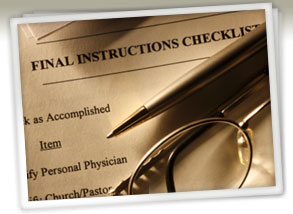
Choosing an Executor
Choosing an Executor (Executrix, if a female) should not be taken lightly. The Executor is the person you will trust your Estate to and be the person responsible for carrying out your wishes and seeing
your plans through.
Being an Executor is time consuming and, at times, can be difficult and stressful. It is the Executor’s job to keep all records and be available for an unforeseeable period of time to administer your Estate duties. It is important to discuss with the Executor what the job will entail.
It is recommended you choose an “alternate” Executor in case the chosen Executor predeceases you or the Executor feels they are no longer willing or capable of acting as an Executor.
Duties of an Executor
The primary duties of an Executor are:
- To pay debts and funeral expense
- Control the administration of the Estate
- Identify and protect the assets of the deceased
- Distribution of the Assets
- Legal accounting and accountability to the beneficiaries
Download the People’s Law School “Being an Executor” publication here.
Executor Checklist
Typical Asset List
- Real estate (home and vacation property etc.)
- Bank accounts, tax-free savings accounts etc.
- Registered (RRSP) and non-registered investments (guaranteed investment certificates, (GIC’s), Canada Savings Bonds etc.)
- Insurance policies and annuity face values
- Personal property (vehicles, jewelry, art collections, heirlooms)
- Pension plan assets (company pension plans)
- Business ownership value
Typical Liability List
- Real Estate Mortgages
- Credit Cards, lines of credit, car loans etc.
- Offsetting investment-related debt
- Family support payments
(Record account numbers for each asset & liability instrument)
Documentation Location
The following items should be stored in a safe place such as a safety deposit box with your financial institution:
- Original Will and Power of Attorney
- A list of your professional advisors and contact information
- Names and addresses of your Executor/s and beneficiaries
- Names and addresses of the Guardian’s of your children
- The asset and liability listed above
- Birth/Marriage Certificates
- Real Estate documents
- Home insurance (with pictures of your home)
- Details of pre-planned funeral arrangements
- Any other document that is difficult to replace
![]() Click here to download a detailed version of the Executor’s Checklist in pdf. format.
Click here to download a detailed version of the Executor’s Checklist in pdf. format.
![]() Click here to download a copy of the "Being an Executor" booklet.
Click here to download a copy of the "Being an Executor" booklet.
Joint Tenancy
In most instances property owned as “Joint Tenants” have the right of survivorship and will automatically transfer to the surviving joint tenant and for probate purposes is eliminated from the estate.
In the event of a common disaster (such as a car accident, acts of God etc.) the law presumes that the youngest joint tenant has died last. Accordingly, the jointly held asset would roll into the estate of the younger joint tenant and be dealt with in accordance with “their” Will or intestacy.
Contact Us
phone: 604-534-0144
fax: 604-534-7985
20416 Douglas Crescent,
Langley, BC, V3A 4B4
